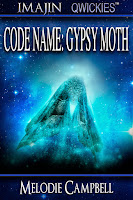The genres are tricky things. If I write a mystery and set it in the past, it’s considered a historical mystery. So, if we are classifying it, we would call it a Mystery first, and then Historical, as a subgenre of mystery genre. Everyone’s happy.
But what if I set it in the future?
This is exactly what has happened to me recently. For the very first time, I was asked to write a crime story for an anthology, without going through the usual submission process. The anthology had the delightful premise: anything goes. That is, I could write any subgenre, and set it anywhere, anytime. *rubs hands in delight*
A particular story had been percolating in my brain for weeks, pounding to get out. My friends and readers know that I like writing from the other side of the crime spectrum. In The Goddaughter series, I write from the point of view of a mob Goddaughter who really doesn’t want to be one, but keeps having to pull off heists to bail out her family. The books are fun, and weirdly, justice is done by the end, regardless of her family connections.
So this new story was going to feature a kick-ass female marshal from the witness protection program. Her job is to arrange the ‘hide’ after someone has testified in court. Thing is, the transportation is by space travel, because the plot is set far in the future.
I sent it to the anthology editors. They loved it. One of my best twists ever, they said. They liked the fact that it was hard-edged – unusual for me. I breathed a sigh of relief. And then two months later, they came back. The publisher was having second thoughts. He thought the science fiction setting would not be a good fit for a mystery anthology. *author reaches for gun*
So they asked if they could reprint one of my award-winning stories instead. I gave them a favourite (Hook, Line and Sinker) that was also hard-edged. This is the one that had me sharing a literary shortlist with Margaret Atwood (Atwood won.) It would have a second life, which is always nice.
Meanwhile, I had this story on my hands, one that everyone loved, written especially for an anthology, that was now homeless. *pass the scotch*
This was the time of Bouchercon 2017 in Toronto. I was hanging with the AHMM gang, who were recording me reading my own work, Santa Baby, for a podcast to go up on their site. (It’s there now *does happy dance*) So I asked if they would be interested in reading it.
Sure, was the answer. Sometimes they publish stories set in the near future. I didn’t think this one would qualify. I was right.
They didn’t take it. But they did suggest sending it to their sister Dell mag, Asimov’s Science Fiction Mag. I might. But I'd rather have a mystery market.
My point is this: Usually, we classify a story as a mystery if the plot is a mystery. The setting comes second. A historical mystery is still classified as a mystery. A mystery with a strong romance element is still a mystery if the plot is a mystery plot. But in the case of a future setting, it doesn’t matter what the plot is. The setting is key to the classification.
I probed a bit among my author contacts. One said that he had written a series billed as sci-fi mystery, and this was his baffling and witty conclusion: he managed to alienate the mystery readers, and confuse the sci-fi readers. Sales were a lot better when they reclassified the thing as sci-fi only
So to answer that initial question: When Is a Mystery not a Mystery? When it’s set in the future.
What about you? Have you come across this before? Any suggestions?
UPDATE: The intrepid editors at Mystery Weekly Magazine say they love A Ship Called Pandora. It comes out soon.
 |
| on AMAZON |
Here's another fun scifi crossgenre book: CODE NAME: GYPSY MOTH
It isn't easy being a female barkeep in the final frontier… especially when you're also a spy!
(Good thing I had a traditional publisher for this one. Because I have NO IDEA where to promote this.)





















